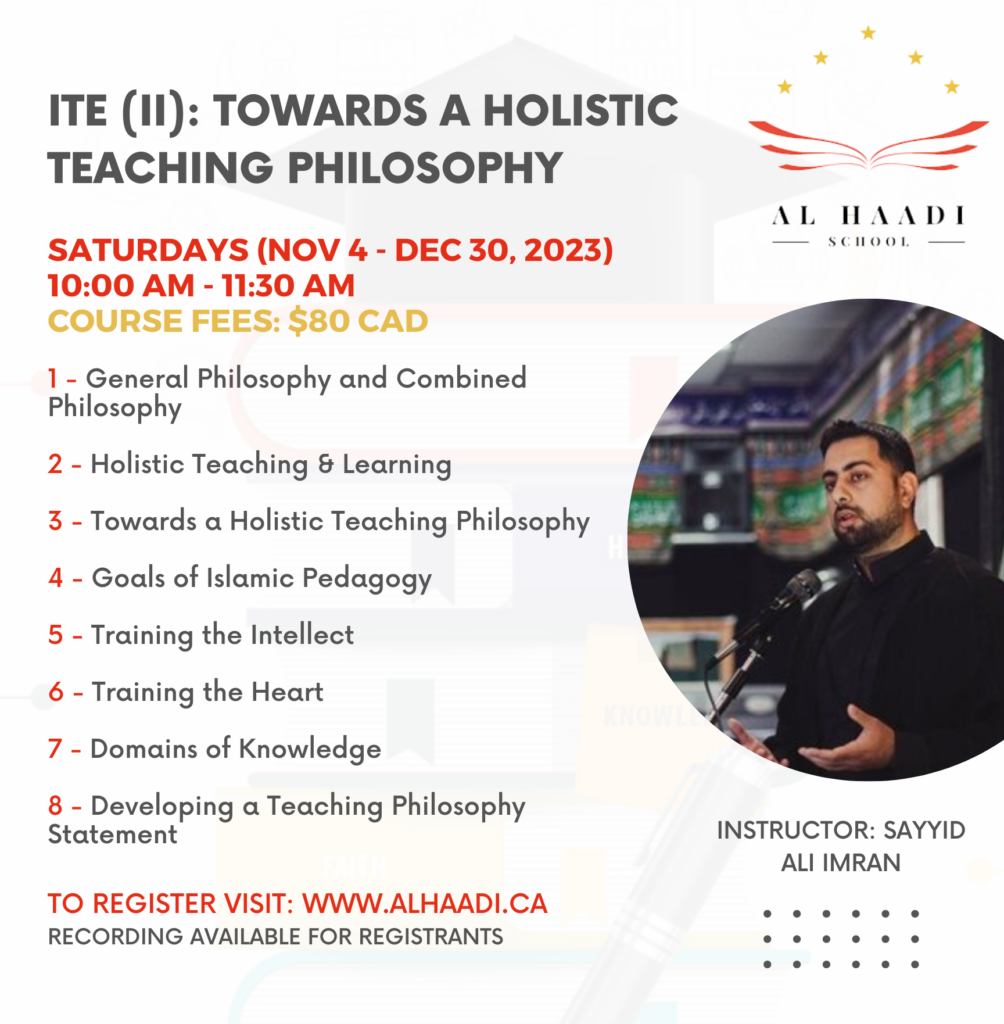
Registration Link: https://forms.gle/1xhVCVrPherGmWvg6
Course Instructor: Sayyid Ali Imran
Date: Saturdays – November 4th, 2023 – December 30th, 2023
Time: 10:00 AM – 11:30 AM EST
Course Fees: $80 CAD
Online – Live participation on Zoom (recording available for registrants).
Course Description
Building on ITE (I), this course will dive deeper into what it means to be a Muslim educator. A Muslim educator is someone who adopts holistic approaches to teaching and learning. We will explore the difference between holistic and reductionist approaches to teaching, and identify key ontological and epistemic principles that make up the basis for developing the skills for teaching holistically. The course intends to equip teachers to be able to write a comprehensive teaching philosophy statement by the end of the course, which will serve as a dynamic professional document for themselves. A certificate will be issued for those who complete the course including the teaching philosophy statement.
Pre-Requisites
- Students should have a minimum of bachelor’s degree or a college certificate in a relevant field and/or be working as an educator or working towards becoming an educator.
- Once registered, we will review your application and send you a confirmation email with payment methods.
- Ideally, participants would have finished ITE (I): Theology for Muslim Educators but exceptions can be made on a case by case basis
Course Outline
1) Lesson One: What is General Philosophy and Combined Philosophy?
- What is studied in general philosophy texts written by Muslims?
- Schools of thought and discussions on existence, quiddity, God, soul.
- What is combined philosophy? What is teaching philosophy?
2) Lesson Two: Holistic Teaching & Learning
- What were the philosophical, psychological, and social contexts in the West that led to discourse on a holistic curriculum?
- What is a holistic curriculum as opposed to a reductionist curriculum? How does the former change one’s approach to teaching and learning?
- Transmission, Transactional, Transformational orientations
- Moving towards a holistic teaching philosophy as Muslim educators
3) Lesson Three: Towards a Holistic Teaching Philosophy
- What are our fundamental ontological, epistemic and pedagogical assumptions as educators?
- What drives human behaviour? The intellect, heart, and the body.
- Ontological & epistemic principles for holistic teaching
4) Lesson Four: Goals of Islamic Pedagogy
- What are the main goals and aims of Islamic pedagogy?
- Overview of some pedagogical methods
5) Lesson Five: Training the Intellect
- What are some ways by which we can train the intellect?
- What does critical thinking mean and what techniques can be used to inculcate it?
6) Lesson Six: Training the Heart
- What are some ways by which we can train the heart?
- What are some techniques to strengthen intuitive thinking, self-awareness and piety
7) Lesson Seven: Domains of Knowledge
- What is the difference between a multidisciplinary, interdisciplinary and transdisciplinary approach?
- What are some ways to connect academic disciplines and school subjects together?
8) Lesson Eight: Developing a Holistic Philosophy Statement
- What is a teaching philosophy statement, and why should teachers develop one?
- What are key questions that must be answered in a teaching philosophy statement?
- An overview of a few pedagogical techniques